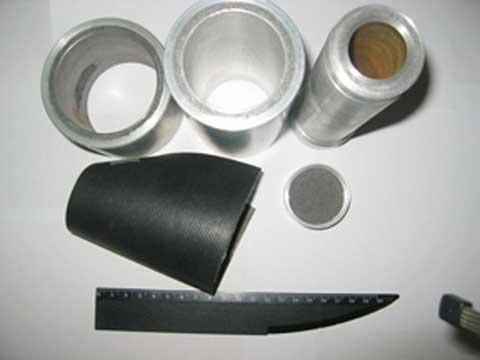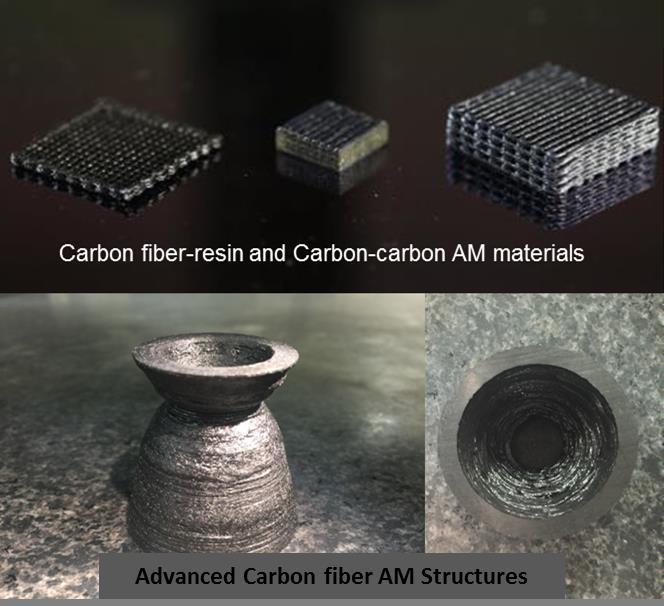High performance carbon fiber/thermoset polymer (CF/thermoset) composites are a potentially transformative materials solution for a range of applications as they can have mechanical properties of steel at a fraction of the density. However, the development and application of these materials is limited by the process by which they are manufactured.
High performance CF/thermoset composites (typically based on aromatic epoxy resins) are produced via a labor intensive winding and hand layup process which is both costly and severely limits the control over the final component micro-meso structure and further the performance, reliability and repeatability of the parts and process. Chopped or short mixed carbon fiber/epoxy composites are a cheap alternative to continuous CF/Epoxy systems. However, the manufacturing processes utilized to form short fiber composites (injection, spray molding and pressing) provides little control of the internal fiber phase alignment - limiting the mechanical performance and reliability of final parts.
The poor processability of current short fiber/epoxy composite systems precludes their use in all but the most basic of molding and casting processes - limiting the shape, complexity and architectural control over the final part. In addition - chopped or discrete CF/epoxy & potential continuous fiber DIW fiber composite deposition using direct ink wiring or other novel means is limited by current epoxy resin systems which preclude the use of DIW or any other method of constructing a self-supporting shape of any complexity that can mechanically constrain the fibers on a reasonable manufacturing timeframe (minutes/seconds).
No commercial means of additively manufacturing continuous or short fiber-reinforced thermoset through direct ink writing (DIW) or any other AM process currently exists. This is in part a result of the limitations of current resin and processing technologies which do not allow rapid cure or accurate spatial orientation of the fiber phase within the resin matrix in a part.
LLNL researchers have developed the hardware and chemistry to allow additive manufacturing of short carbon fibers in a thermoset polymer matrix which have a high degree of structural alignment over conventional cast or pressed short/chopped carbon fiber polymer composites.
The invention is based on the shear dispersal, alignment and concentration of fiber fraction within a resin system to yield a direct Ink Writable (DIW) system that can be utilized to 3D print complex architectures of highly aligned CF/epoxy resin composite with feature resolutions as low as 250um.
The short carbon fibers can be produced in a range of polymer matrices including bisphenol F epoxy resins and cyanate esters. The apparatus, systems, and methods provide additive manufacturing of a fiber reinforced polymer (FRP) product using a direct ink writing system
The novelty of LLNL’s invention is primarily the ability to both align and concentrate CF within a polymer matrix during the printing process using a novel printing head design. Secondary novelty lies in the combination of this printing system with a novel latent curing resin system and LLNL DIW technology to yield a complete system capable of 3D printing complex geometries at high resolutions and high fiber volume fractions with high degrees of controlling internal fiber alignment.
Additive manufacturing and 3D printing technologies offer the potential to both fully automate the production of CF composites and allow new degrees of freedom and control over the fiber placement orientation and microstructure - leading to vast improvements in performance, reliability, scalability and cost reductions.
LLNL’s additive manufacturing for fiber reinforced composites technology has applications in producing products used in aerospace, automotive, construction, defense, electronic, medical, high pressure vessels and other industries.
LLNL has patent(s) on this invention.
US Patent No. 9862140 Additive Manufacturing Continuous Filament Carbon Fiber Epoxy Composites published 01/09/2018
US Patent No. 9944016 High performance, rapid thermal/UV curing epoxy resin for additive manufacturing of short and continuous carbon fiber epoxy composites published 04/17/2018



